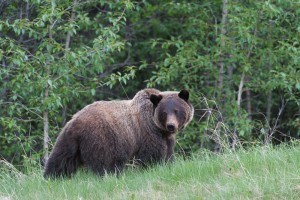
UPDATED: Two men have been charged for allegedly killing a grizzly bear near Edson that was collared near the Fairmont Jasper Park Lodge this spring, according to a spokesperson for the province’s fish and wildlife enforcement branch.
On May 26, fish and wildlife officers were notified by a fRI Research biologist from Hinton that a collar affixed to a grizzly bear had stopped working near Edson.
As a result an investigation was launched and it was confirmed that a young male, about three or four years old, weighing close to 200 lbs, was shot and killed by a poacher.
“I can tell you that a collared grizzly bear was poached in the Edson area and it is currently under investigation so we’re not releasing any further details at this time,” said Brendan Cox, a spokesperson for the fish and wildlife enforcement branch.
He said a grizzly bear was located during the investigation and was seized for evidence.
“Grizzly bears are a strictly protected species in the province so these incidents are quite rare,” said Cox, who was unable to confirm if there were any other open investigations realated to poaching.
Sean Kinney, a spokesperson for the fRI Research, confirmed the collar was part of its grizzly bear research program and said it was fully cooperating with investigators.
“At this point we don’t have much to say other than we can confirm it was a bear that was collared by our team and it was originally collared in Jasper,” said Kinney.
“Part of our research agreement to be able to actually go and collar bears is we have to notify anytime that a collar stops transmitting,” said Kinney.
While poaching is rare, he said three collared grizzly bears were illegally killed in 2013.
Parks Canada also confirmed it was aware of the incident.
51���� of the investigation comes nearly two weeks after the province released a draft version of its grizzly bear recovery plan.
The plan outlines several strategies to protect the endangered species, including reducing human-caused mortality, protecting critical habitat and improving habitat links across highway corridors.
According to a 2010 study, the province estimates there are 691 grizzly bears in Alberta, including bears in Banff and the southern half of Jasper National Park. That’s approximately 300 bears less than what was initially estimated in 2002, according to the draft recovery plan.
To slow down and reverse the population’s decline, the province made it illegal to hunt grizzly bears in 2006 and officially listed the species as threated in 2008.
According to the draft recovery plan, over the past five years the four highest sources of mortality were poaching, accidental collisions with vehicles or trains, self-defence kills (usually by hunters), and hunters misidentifying a grizzly bear for a black bear and accidentally killing it.
Since the province banned sport hunting the number of grizzlies killed by humans has dropped, however illegal hunting remains the biggest killer.
According to the draft recovery plan, between 2006 and 2013 27 per cent of grizzly bear deaths were due to illegal hunting, while vehicle collisions were responsible for 21 per cent of human-caused death.
To put those numbers in perspective, in 2013 more than 25 bears died due to human causes.
Ronald Motkoski, from Edson, faces three charges under Alberta's Wildlife Act, including hunting during a closed season, possession of wildlife or a controlled animal and willfully giving false information.
John Grant, from Fort McMurray, was charged with one count for the possession of wildlife or a controlled animal under section 55 of the Wildlife Act.
Both men will appear in Edson provincial court on August 16.
Anyone who suspects suspicious hunting activity is urged to call the report a poacher hotline at 1-800-642-3800.
Paul Clarke
[email protected]
